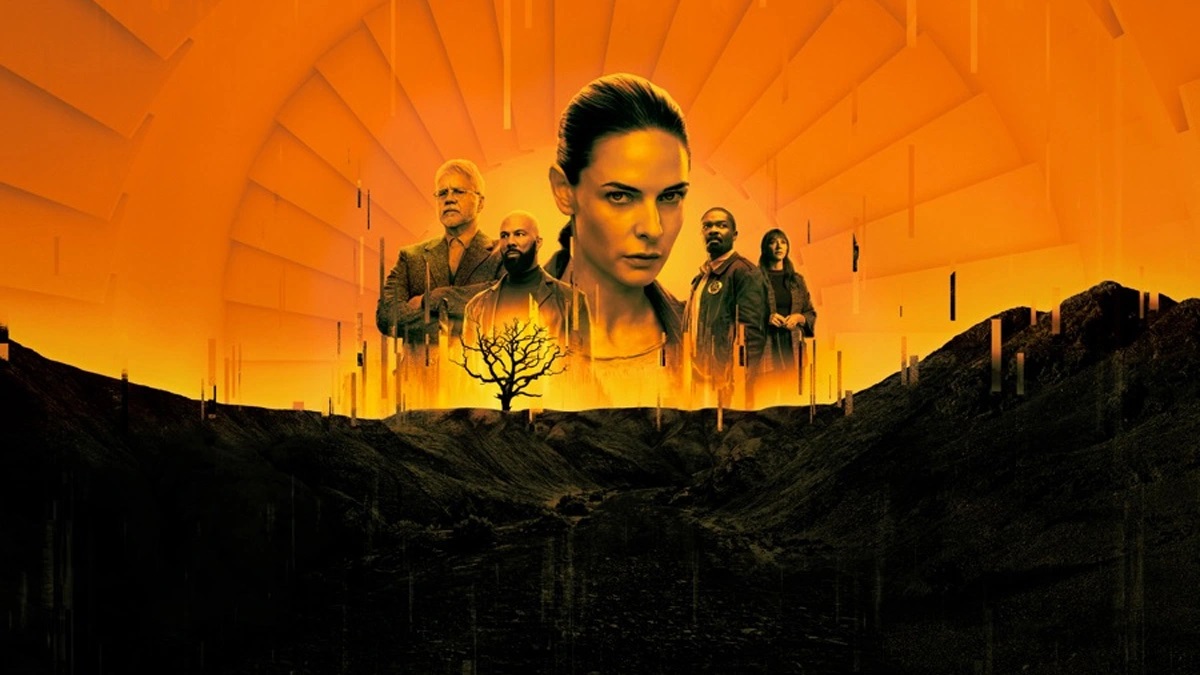I’m going to let you in on a secret: reviewing TV shows usually isn’t all that hard. Sure, I occasionally fret over how well I’ve understood the creators’ intent or agonize over what score to give, but with rare exception, it’s not that difficult to determine if something is good or not. Silo is one of those exceptions.
On paper, the first season of this Apple TV+ sci-fi dystopian drama (based on Hugh Howey’s novel series of the same name) has the makings of great TV. Its high-concept story is intelligently told, its performers are uniformly excellent, and its production design is truly first-rate. Yet there’s something unmistakably “off” with Silo Season 1, and this leaves the show feeling as hollow as its namesake.
Silo’s initial 10-episode run introduces us to Juliette Nichols (Rebecca Ferguson), the newly appointed sheriff of the Silo – a sprawling subterranean bunker that’s home to what remains of society. Nichols is investigating the supposedly accidental death of her lover, George Wilkins (Ferdinand Kingsley), following clues left by the last sheriff, Holston Becker (David Oyelowo). Nichols’ search for answers soon brings her into conflict with security chief Robert Sims (Common) and leads her to the realization that everything the Silo’s residents believe may be a lie.
As set-ups go, Silo’s is compelling enough. It’s also far from original. Post-apocalyptic future yarns built around the narrative conceit that all is not what it seems are a dime a dozen, both on the screen and in print. What is original is the way that Silo showrunner Graham Yost and his writers’ room handle the actual execution of the show’s various mystery elements. Another show almost certainly would’ve kept back the reveal of what the world outside the Silo is like until the end of Season 1 – if not the end of the entire show. But Silo plays this card early on, freeing it up to tease other, decidedly more interesting unanswered questions (chiefly, who is behind Silo’s conspiracy and why), instead.
The show’s writers and directors – the latter of whom include big-name talents such as Morten Tyldum, David Semel, Bert & Bertie, and Adam Bernstein – also deserve kudos for keeping these mysteries chugging along without skimping on character development. From Nichols’ unspoken grief over George’s death to her deputy Paul Billings’ (Chinaza Uche) private struggle with a debilitating illness, Silo makes a concerted effort to anchor proceedings in real human drama. It’s just a shame that this aspect of Silo’s first season is also the weakest.
As I alluded to earlier, it’s hard to pinpoint exactly why this is. Part of it is probably the fault of Silo’s occasionally stilted dialogue (including clunky platitudes like “A whole day could be saved with just a smile”), however, you can also chalk up at least some of the show’s emotional disconnect to its po-faced vibe. Silo was never going to be a laugh-a-minute affair – nor should it have been. Yet this first batch of episodes approaches its source material so humourlessly that it’s hard to care about the characters and, by extension, the story itself.
The problem runs deeper than the inhabitants of the Silo being a dour bunch, though. For the most part, they’re off-puttingly self-possessed, as well. Unless they’re outright lying, what characters say in Silo tends to line up with what they actually do. They have a stated goal and they go about achieving it. There’s little sense that they’re going through the kind of inner crises that you find in a truly “grown-up” show like Succession. The essence of drama is (as William Faulker once put it) “the human heart in conflict with itself” – but everybody’s tickers seem pretty chill in Silo.
What affinity we do have for Silo’s cast of characters comes almost entirely from the actors who play them, all of whom turn in strong performances. Ferguson is particularly good as Nichols, letting just the right amount of tenderness shine through the engineer-turned-sheriff’s flinty exterior. Common also makes a strong impression as the quietly menacing Sims, while Tim Robbins is dependably effective as the sinister head of the Silo’s IT department, Bernard Holland. David Oyelowo and Rashida Jones deserve a shout-out for their guest appearances early in the first season, as well. The genuine warmth they bring to their characters’ doomed romance is sorely missed throughout the show’s remaining episodes.
Fortunately, what Silo lacks in heart it mostly makes up for in production values. Production designer Gavin Bocquet and his team have come up with an inspired retro-futuristic aesthetic for the Apple TV+ drama that doesn’t just distinguish itself from the many other entries in the overcrowded dystopian genre, but just as importantly, carries with it the air of authenticity.
This is especially true of Silo’s cleverly conceived and executed staircase set, which convincingly doubles as several different locations. The mostly seamless visual effects add to the show’s sense of verisimilitude, the upshot of which is a world we want to spend time in – even if we’re mostly ambivalent towards the people who live there.
But imagine we weren’t ambivalent. Imagine Silo’s recently announced second season paired its technical brilliance with actual emotional oomph. Wouldn’t that be a sci-fi show for the ages? It’s hard to say for sure, but if nothing else, it’d make reviewing it a bit easier next time around.
READ NEXT: 10 2000s Animated Movies You Probably Forgot About
Some of the coverage you find on Cultured Vultures contains affiliate links, which provide us with small commissions based on purchases made from visiting our site. We cover gaming news, movie reviews, wrestling and much more.




